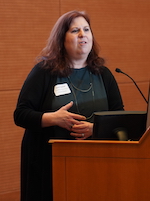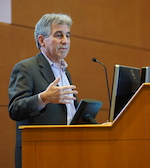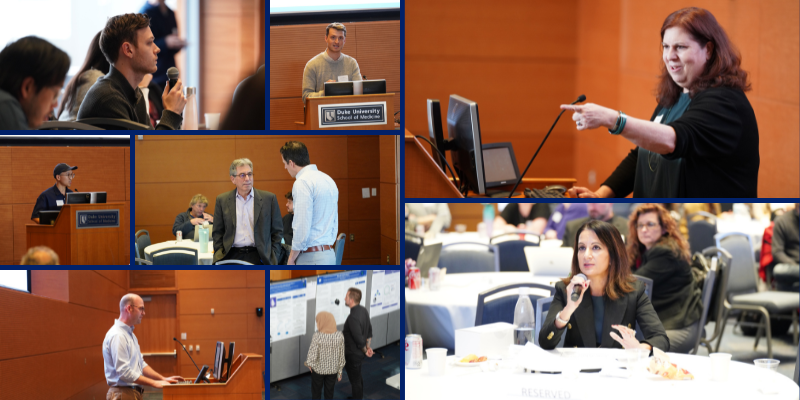Unlocking Genomic Potential: Highlights from Genomics Scientific Retreat

The Duke School of Medicine Precision Genomics Collaboratory (PGC) held the third annual Genomics Scientific Retreat on December 8 in the Trent Semans Center Great Hall. The event showcased two keynote speakers; 13 short talks and over 20 posters from trainees, research staff, and junior faculty; talks from previous PGC pilot grant winners, and chances to network with others interested in genomic research.


In addition to the keynote addresses, Andrew Landstrom, MD, PhD, associate professor of pediatrics; and Derek Peters, MD, PhD, postdoctoral fellow in the lab of Yarui Diao, presented research they were able to complete with the help of PGC’s $20,000 Rare Disease Pilot Grant.
Landstrom used genomic sequencing to better understand sudden unexplained death in the young (SUDY) and look for genetic markers that could put people at an increased risk for SUDY.
Peters used single cell ATAC-seq to catalog regions of the genome that could be relevant to peripheral arterial disease, a disease caused by plaque buildup in the arteries that narrows or blocks the arteries that carry blood from the heart to the legs and arms.
Among the 13 oral presentations from graduate students, postdoctoral and other fellows, research staff, and early-stage investigators, the top three received awards:
- Samuel Reisman | Graduate Student, Center for Biomolecular and Tissue Engineering
Direct reprogramming of human astrocytes to neurons with CRISPR-based epigenome editing - Robin Perelli | Graduate Student, Cell and Molecular Biology
AX1BP3 loss is an autosomal recessive cause of arrhythmogenic cardiomyopathy and TRPV4-mediated arrhythmogenesis - Guinevere Connelly | Graduate Student, University Program in Genetics and Genomics
Elucidating Human Genetic Variants that Regulate Influenza A Virus Infection
The top three posters also received awards
- Liuyang Wang |Assistant Research Professor of Molecular Genetics & Microbiology
- Tiffany Ko | Graduate Student, Neurobiology
Polycomb repressive complex 2 regulates olfactory basal cell fate during adult olfactory neurogenesis - Justin Savage | Graduate Student, Neurobiology
How does neuronal contact induce astrocyte transcriptional maturation?
